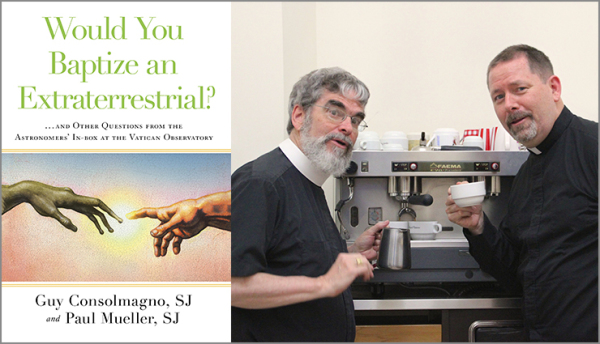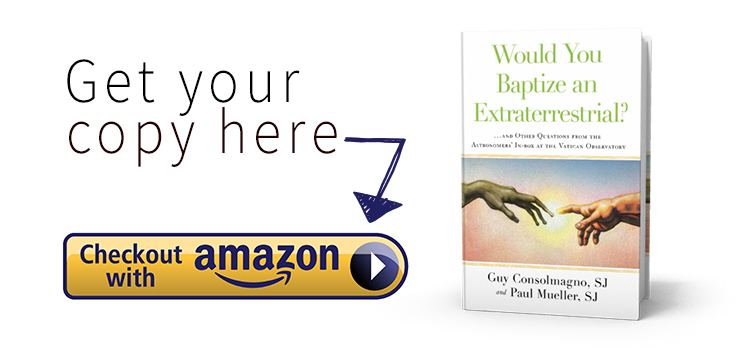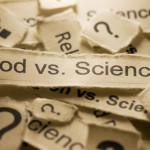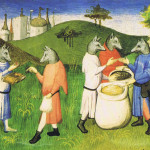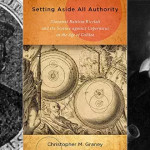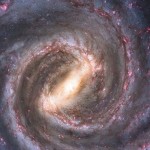Would You Baptize Aliens? An Interview with Two Vatican Astronomers
by Brandon Vogt
Filed under Christianity and Science, Interviews
Today I sit down with two Catholic scientists, Brother Guy Consolmagno, S.J. and Father Paul Mueller, S.J. Both men work for the Vatican Observatory, which is based at Castel Gandolfo, Italy. And together they wrote a new book, Would You Baptize an Extraterrestrial? and Other Questions from the Astronomers' In-box at the Vatican Observatory (Image Books, 2014).
Brother Consolmagno is a graduate of the Massachusetts Institute of Technology, where he earned a B.A. and M.A. in planetary science. After earning a Ph.D from the University of Arizona, he taught at Harvard and MIT before eventually lading at the Vatican Observatory. There he works as the curator of the Vatican Meteorite Collection and researches the connections among meteorites, asteroids, and small bodies in the solar system. He has written more than 40 refereed scientific papers and a number of popular books, including his memoir, Brother Astronomer: Adventures of a Vatican Scientist. Earlier this year, the American Astronomical Society awarded him the Carl Sagan Award for excellence in communicating planetary science to the general public.
Brother Consolmagno is also well known for his fun appearance on The Colbert Report:
Father Mueller is a philosopher of science who serves as superior of the Jesuit community at Castel Gandolfo. He holds a B.S. in physics from Boston University, an M.A. in philosophy from Loyola University of Chicago, M.Div and S.T.M. degrees in theology from the Jesuit School of Theology at Berkeley, and a Ph.D in the philosophy of science from the University of Chicago.
BRANDON: Brother Guy, as a PhD physicist, Jesuit brother, Vatican astronomer, and Colbert Report guest, you're a sign of contradiction. How did you end up a religious scientist? Do you find any contradiction between those two roles?
BROTHER GUY CONSOLMAGNO, SJ: I have no idea why you'd see any contradiction; I don't. I struggle mightily to figure out what bad assumptions people are making about science and religion when they think that! I know scientists of all religious faiths, and that should be no more surprising than to say that I know religious people who have all sorts of jobs!
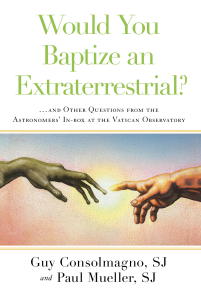 Of course my scientific training shapes the habits of thought I use when I think about God, but I also know that my way of thinking about God is neither the only way to think, nor unique just to me as a scientist. And being a person of faith obviously shapes the kinds of questions I think are fun to work on, and the way that I will go about working on them. For instance, I hate the idea of hoarding data; you learn by sharing, and learning is more important to me than getting a career edge on some scientific rival.
Of course my scientific training shapes the habits of thought I use when I think about God, but I also know that my way of thinking about God is neither the only way to think, nor unique just to me as a scientist. And being a person of faith obviously shapes the kinds of questions I think are fun to work on, and the way that I will go about working on them. For instance, I hate the idea of hoarding data; you learn by sharing, and learning is more important to me than getting a career edge on some scientific rival.
I think the big mistake behind the question is thinking that science and religion are rival sets of "things" that must be "believed." “What do I do, if science tells me one thing but religion tells me another thing? Which do I believe?”
There’s a false assumption at the center of that question—because neither science nor religion are about “believing” in “things”. But my religious belief is not in a “thing,” but in a Person—indeed, Three Persons...the Father, Son, and Spirit as described and identified in the Creed, and in the Church that leads us to those Persons. And science is not about the "things" we call data points, but in the description we come up with to describe how those "things" work. The data points stay the same, but the description changes as science changes.
BRANDON: Fr. Georges Lemaître (1894-1966), a Belgian cosmologist and Catholic priest, is widely considered the father of the Big Bang theory, which he introduced in 1927. Today it's the most widely accepted theory for the origin of the universe. However, Fr. Lemaître and Pope Pius XII disagreed on the theory's implications for a Creator God. What's the significance of the Big Bang and does it provide support for a Creator?
BROTHER CONSOLMAGNO: Lemaitre himself was adamant that his theory was a nice description based on the mathematics of Relativity and the observations of Hubble, but it should never be taken as a last word... much less something infallible on which one could base one's faith. And in fact, following their conversation, it's pretty clear that he convinced Pope Pius XII of this, as well. I would turn the relationship between Big Bang and Creator around...and suggest that belief in a Creator God, who is "The Word"—the Logos...Logic...Reason—provides support for the idea that we ought to be able to understand Creation in terms of a rational, mathematical theory like the Big Bang.
BRANDON: Back in 2006, the International Astronomical Union downgraded Pluto from planet to "dwarf planet." In the book you note the special role the Vatican played in this decision. How was the Church involved?
BROTHER CONSOLMAGNO: We were astronomers among our fellow astronomers who debated the point. As it happened, I was on one of the (several) commissions that was involved in the discussion, and Fr. Corbally was on the committee that wrote the final resolution voted on by the IAU. But the whole topic is interesting for another reason: it reminds us that "science" is not eternal, and we shouldn't be surprised when it changes its mind in the face of new data. That's one reason why science is not a good foundation for religious belief.
BRANDON:In May 2014, Pope Francis said, "Imagine if a Martian showed up, all big ears and big nose like a child's drawing, and he asked to be baptized. How would you react?" What would your response be?
BROTHER CONSOLMAGNO: I’d want to be sure they really knew what they were asking for! How could you tell? Well...are they willing to share a meal with me? To help me out if I am hurt, at the side of the road? To offer their life for me? And would I be willing to do likewise?
FATHER PAUL MUELLER, SJ: Let’s not forget that Pope Francis was mainly making a point about humans, not about Martians. He was talking about how the early Church struggled over the question of whether non-Jews could be admitted to baptism. The early Jewish-Christians saw themselves as God’s Chosen People, and saw in Jesus the Messiah who God had promised would save them. They had difficulty imagining how that salvation could be extended to non-Jews. But in the end the Church decided that all people were chosen by God, and that baptism could be extended to all. So I think that the Pope’s question was mainly about us and how we see ourselves as chosen by God, rather than about Martians.
BRANDON: You spend several pages in the book on the Galileo affair. What really happened? Could the dispute have been avoided?
BROTHER CONSOLMAGNO: History is made by individuals; individuals could always make different decisions. What happened to Galileo and all the other people in that time and place was the result of the times and the politics and the fears and the hopes of all those individuals. It's not surprising that it happened; but it wasn't necessarily inevitable.
FATHER MUELLER: What really happened with Galileo is a long and complex story—read our book! But our book can get at only some aspects of the story. Of course the dispute could have been avoided, or could have gone differently. History is contingent, after all. And while we’re at it, the subsequent history of interpretation of the Galileo story also could have gone differently—it didn’t have to be interpreted as a great symbol of conflict between faith and science.
BRANDON: Suppose you had one minute to explain to an atheist how "the heavens declare the glory of God." What would you say?
BROTHER CONSOLMAGNO: Go outside and look for yourself! If there's not a God they are praising, there ought to be!
FATHER MUELLER: You can see the lunch that your wife packs for you just as lunch, or as an expression of the love which she has for you. You can see the stars in heaven just as stars, or as an expression of the Love which God is. For those who believe in the God, who is Love and who is ultimate Creator of being and order, the glory of God is declared not just by the heavens but by everything else that exists: by pebbles, earthworms, and trout scales; by hornet nests, finches’ wings, and hockey players; and yes, by atheists too.
Related Posts
Note: Our goal is to cultivate serious and respectful dialogue. While it's OK to disagree—even encouraged!—any snarky, offensive, or off-topic comments will be deleted. Before commenting please read the Commenting Rules and Tips. If you're having trouble commenting, read the Commenting Instructions.




